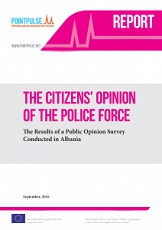2016 THE CITIZENS’ OPINION OF THE POLICE FORCE - The Results of a Public Opinion Survey Conducted in Albania
2016 THE CITIZENS’ OPINION OF THE POLICE FORCE - The Results of a Public Opinion Survey Conducted in Albania
Contributor(s): Saša Đorđević (Editor)
Subject(s): Politics / Political Sciences, Politics, Civil Society, Governance, Security and defense
Published by: BCBP Beogradski centar za bezbednosnu politiku
Keywords: police force; public opinion; Albania; police sector
Summary/Abstract: The most trusted institutions in Albania are the media and the education system. Slightly more than half (56%) of the respondents trust the police, while 43% have no trust in this institution. The least trusted institution is the Parliament (25%), followed by the judiciary (33%), customs (34%), the prosecutors’ offices (34%) and the Anti-Corruption Agency (35%). Corruption remains one of the major challenges of the governance in Albania, regardless of the existence of various anti-corruption institutions and measures. Police corruption is still persistent, even though the survey results show improvement of public trust in the police. The concern is that the important pillars in the fight against corruption are also perceived by the respondents as the most corrupt institutions in Albania: judiciary (79%), prosecution (76%), and the Parliament (75%). Corruption is least widespread within the media and non-governmental organisations. Despite the respondents’ prevailing opinion of police being corrupt, it is worth noting that 56% of the respondents believe that employment in the police is gained through public competitions, knowledge and capabilities of candidates. However, Influential friends and political ties form a shortcut to police employment for 71% of the respondents, which is a result that should cause concern in police officials. More than half (55%) of the respondents state that the police act mostly as a service to the citizens, while one fourth of the respondents (25%) who believe the opposite. The data show a high level of police politicisation: 40% of the respondents believe that politicians have complete influence over the operational work of the police force. An additional 39% share the opinion that politicians influence police work to a great extent. The data also show a contradiction in the citizen’s perception on the merit-based recruitment of police officers and the high level of political influence on policing. Traffic police force is considered the most corrupted police unit, (64%), followed by Minister’s closest associates (59%), border police and criminal police (54%) respectively. This indicates that the respondents associate police corruption mainly with bribery, despite the diversity of the forms of police corruption. Moreover, when asked about the institutions to which respondents would first report a case of police corruption, more than half (58%) said that they would report it to the local police station and the media. With regard to the impunity culture prevailing in Albania, about one fifth (23%) of the respondents suggest strict punishment of offenders, and another fifth (22%) point out that it is necessary to punish a greater number of high ranking police officers. More than one third of the respondents (36%) indicate that the central Government should lead the fight against corruption in the police organisation, assisted by other proposed institutions. Less than half of the respondents (43%) consider that non-governmental organisations should take active part in the fight against corruption, including collaboration with the state institutions favoured by 26% of the respondents.
Series: BCBP - Assessment of Police Integrity
- Page Count: 24
- Publication Year: 2016
- Language: English
- Content File-PDF

